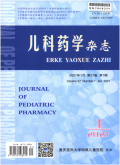儿科药学杂志2024,Vol.30Issue(1):10-14,5.DOI:10.13407/j.cnki.jpp.1672-108X.2024.01.003
儿童青少年慢性疾病用药自我管理评估工具的循证评价
Evidence-Based Evaluation of Self-Management Evaluation Tools for Medication in Children and Adolescents with Chronic Diseases
摘要
Abstract
Objective:To systematically evaluate the current status of self-management evaluation tools for medication in children and adolescents with chronic diseases,so as to provide evidence-based medical evidence to ensure effective treatment outcomes for children and adolescents with chronic diseases.Methods:PubMed,EMBase,the Cochrane Library,CBM,CNKI,VIP,Wanfang and other domestic and foreign databases were systematically retrieved,and the retrieval time was from the establishment of the database to Mar.2023.Literature pertaining to self-management evaluation tools for medication in children with chronic diseases was enrolled and the results were analyzed by descriptive methods.Results:A total of sixteen articles were enrolled according to disease types.The distribution of articles included 43.75%(7/16)on diabetes self-management scales,18.75%(3/16)on children's asthma self-management scales,12.50%(2/16)on adolescents'general self-management scales,6.25%(1/16)on children's insulin treatment self-management scales,and 6.25%(1/16)on children's epilepsy medication self-management scales.Of the included scales,25.00%(4/16)had a theoretical basis and were available in Chinese.The included scales spanned from 1 to 8(3.69±1.74)domains and included from 14 to 52(27.81±10.24)items.However,medication management items were found to be lacking,primarily concerning medication compliance,adjustment of medication dosage,adverse drug reactions,convenience of medication,and sense of medication responsibility.Conclusion:Currently,there is a lack of independently developed self-management evaluation tools for medication in children and adolescents with chronic diseases in China.The current evaluation tools have a single perspective and lack the integration of individual,family,healthcare system and society at different levels.It is recommended to develop and validate self-management evaluation tools tailored to children and adolescents with chronic diseases in China,so as to provide valuable insights for the clinical implementation of self-management regimen.关键词
癫痫/儿童青少年/自我管理/评价工具/循证评价Key words
epilepsy/children and adolescents/self-management/evaluation tools/evidence-based evaluation分类
医药卫生引用本文复制引用
李丹,杨亚亚,俞丹,杨春松..儿童青少年慢性疾病用药自我管理评估工具的循证评价[J].儿科药学杂志,2024,30(1):10-14,5.基金项目
四川省科技计划项目(重点研发项目),编号2020YFSO035 (重点研发项目)
四川省干部保健科研项目(普及应用项目),编号川干研2022-1702. (普及应用项目)

